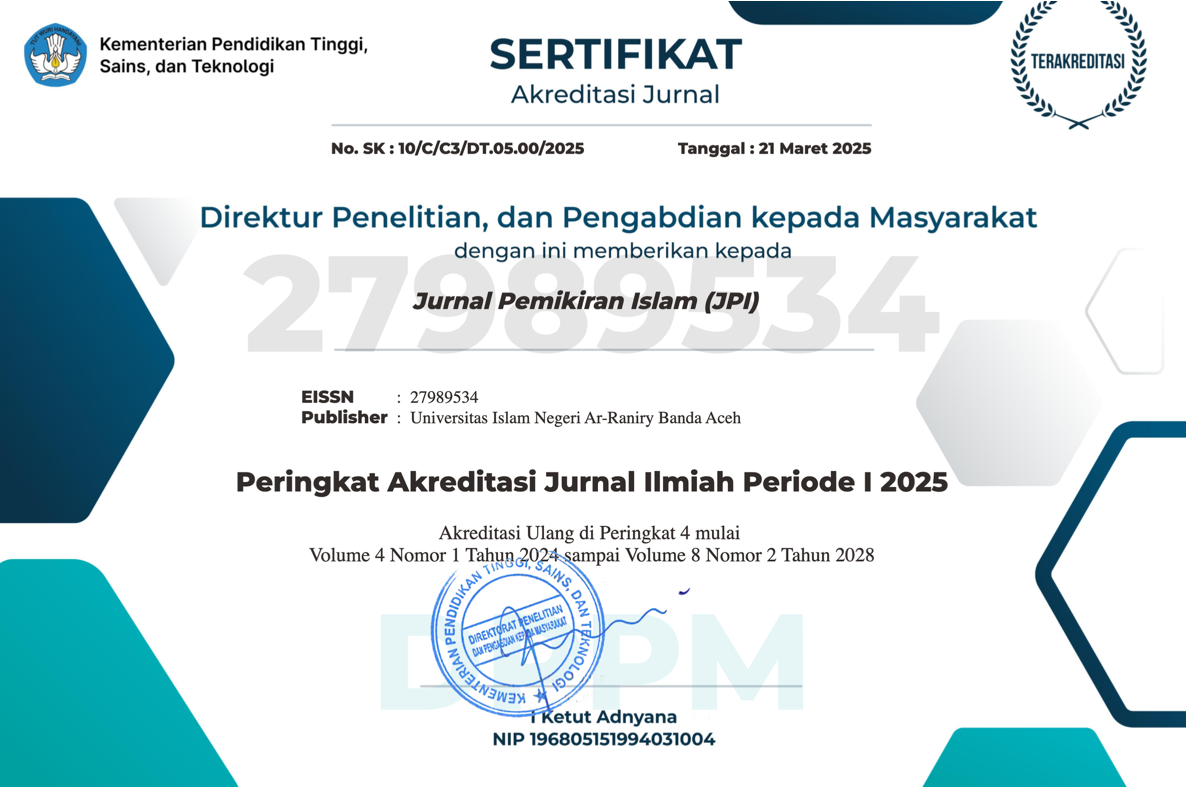Interpretasi dan Kontroversi: Studi tentang Hakikat Insan Karya Ahmad Laksamana
DOI:
https://doi.org/10.22373/jpi.v3i2.21531Keywords:
Hakikat Insan, Haji Ahmad Laksamana, Penafsiran Al-Quran, KontroversiAbstract
Haji Ahmad Laksamana, a controversial figure known through his work “Hakikat Insan”, is often considered deviant from traditional Islamic teachings, particularly regarding the use of Sharia and Tariqa as well as interpretations of the Quran. This article aims to describe the thoughts and Quranic interpretation methodology of Haji Ahmad Laksamana. This study employs a qualitative method with a literature analysis approach. The primary source is the text “Hakikat Insan,” supplemented by various secondary sources, including journals and relevant books. The study finds that Haji Ahmad Laksamana's teachings emphasize the recognition of the essence of knowledge to achieve the level of Insan Kamil Mukamil. His thoughts, reflected in discussions about the relationship between humans and Allah, the dignity of the soul, the essence of the testimony of faith, as well as concepts of Islam, faith, monotheism, and gnosis, demonstrate a unique approach. However, his interpretation method, such as translating Quranic verses into symbols, has sparked controversy and is considered deviant from traditional Islamic understanding. Haji Ahmad Laksamana's controversial ideas are viewed as contradictory to Islamic teachings, diminishing the honor of the Quran and Hadith.
Abstrak
Haji Ahmad Laksamana, seorang figur kontroversial yang dikenal melalui karyanya “Hakikat Insan” sering kali dianggap menyimpang dari ajaran Islam tradisional, terutama dalam hal penggunaan syariat dan tarekat serta penafsiran Al-Quran. Artikel ini bertujuan mendeskripsikan tentang pemikiran, dan metodologi penafsiran Al-Quran Haji Ahmad Laksamana. Kajian ini menggunakan metode kualitatif dengan analisis kepustakaan. Sumber utama adalah teks “Hakikat Insan” serta berbagai sumber sekunder termasuk jurnal dan buku yang relevan. Kajian ini menemukan bahwa ajaran Haji Ahmad Laksamana menitikberatkan pada pengenalan ilmu hakikat untuk mencapai tingkat Insan Kamil Mukamil. Pemikirannya yang tertuang dalam pembahasan mengenai hubungan manusia dengan Allah, martabat nafsu, hakikat syahadat, serta konsep Islam, iman, tauhid, dan makrifat, menunjukkan pendekatan yang unik. Namun, metode interpretasinya, seperti penerjemahan ayat Al-Quran ke dalam simbol, telah menimbulkan kontroversi dan dianggap menyimpang dari pemahaman Islam tradisional. Pemikiran Haji Ahmad Laksamana yang kontroversial dianggap bertentangan dengan ajaran Islam dan mengurangi kehormatan Al-Quran dan hadis.
Downloads
References
Al-Damsyiqi, I. bin U. bin K. al-Q. (2002). Tafsir Ibn Kathir. Dar Toyyibah.
Al-Jiasi, M. M. (1990). Mengenal diri dan Wali Allah. Pustaka Aman Press.
Halim, N. H. A., & Abdullah, W. N. W. (2017). Kaedah Tafsiran al-Quran Halo-N di dalam Buku al-Fathun Nawa. AL-TURATH JOURNAL OF AL-QURAN AND AL-SUNNAH, 2(2), 12–24. https://spaj.ukm.my/jalturath/index.php/jalturath/article/view/46
Hamdani, S. M. (2016). Liberalisme Dalam Kitab Fathun Nawa Ahmad Laksamana. Universitas Sains Islam Malaysia.
Ibrahim, A. F. H. (2003). Tembelang Buku Hakikat Insan: Mendedahkan Penyelewengan Buku Ahmad Laksamana. Jabatan Kemajuan Islam Malaysia.
Ibrahim, A. H. (2014). Hakikat Insan Satu Kritikan. Dewan Bahasa Pustaka.
JAkIM. (1997). Enakmen Pentadbiran Undang-Undang Islam. 3-Smuber Maklumat Fatwa. http://e-smaf.islam.gov.my/e-smaf/index.php/main/mainv1/fatwa/pr/10849
Laksamana, A. (1985). Hakikat Insan. tt.
Mahjuddin. (1991). Kuliah Akhlaq Tasawuf, Kalam Mulia. Kalam Mulia.
Mas’od, M. A. bin. (2015). Diskusi Isu Akidah dan Pemikiran Semasa di Malaysia (II). Jabatan Kemajuan Islam Malaysia.
Mohd Zurita, N. A. A., & Engku Alwi, E. A. Z. (2022). Penyelewengan Akidah dalam Ajaran Sesat di Malaysia: Satu Analisis [Perversion of Faith Heresy in Malaysia: A Review]. Jurnal Islam Dan Masyarakat Kontemporari, 23(2), 197–206. https://doi.org/10.37231/jimk.2022.23.2.677
Nasir, N. M. (2020). Muis | Muis: Islamic Religious Council of Singapore. Majlis Ugama Islam Singapura. https://www.muis.gov.sg/officeofthemufti/Fatwa/Malay-Fatwa-Deviant-Teachings
Nor, S. M. (2019). Tasawuf Satu Pengenalan Asas. Galeri Ilmu.
Downloads
Published
Issue
Section
License
Authors who publish in Jurnal Pemikiran Islam agree to the following terms:
- Authors retain copyright and grant the journal right of first publication with the work simultaneously licensed Attribution-NonCommercial-ShareAlike 4.0 International (CC BY-NC-SA 4.0) that allows others to share the work with an acknowledgment of the work's authorship and initial publication in this journal.
- Authors are able to enter into separate, additional contractual arrangements for the non-exclusive distribution of the journal's published version of the work (e.g., post it to an institutional repository or publish it in a book), with an acknowledgment of its initial publication in this journal.
- Authors are permitted and encouraged to post their work online (e.g., in institutional repositories or on their website) prior to and during the submission process, as it can lead to productive exchanges, as well as earlier and greater citation of published work. (See The Effect of Open Acces)














